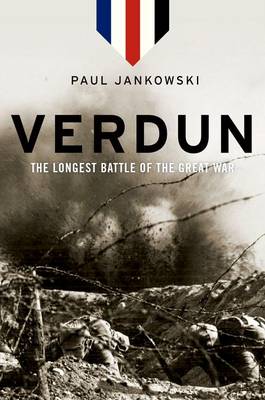21%OFF
Stock image for illustration purposes only - book cover, edition or condition may vary.
Verdun: The Longest Battle of the Great War
Paul Jankowski
FREE Delivery in Ireland
Description for Verdun: The Longest Battle of the Great War
Paperback. .
At seven o'clock in the morning on February 21, 1916, the ground in northern France began to shake. For the next ten hours, twelve hundred German guns showered shells on a salient in French lines. The massive weight of explosives collapsed dugouts, obliterated trenches, severed communication wires, and drove men mad. As the barrage lifted, German troops moved forward, darting from shell crater to shell crater. The battle of Verdun had begun. In Verdun, historian Paul Jankowski provides the definitive account of the iconic battle of World War I. A leading expert on the French past, ... Read moreJankowski combines the best of traditional military history-its emphasis on leaders, plans, technology, and the contingency of combat-with the newer social and cultural approach, stressing the soldier's experience, the institutional structures of the military, and the impact of war on national memory. Unusually, this book draws on deep research in French and German archives; this mastery of sources in both languages gives Verdun unprecedented authority and scope. In many ways, Jankowski writes, the battle represents a conundrum. It has an almost unique status among the battles of the Great War; and yet, he argues, it was not decisive, sparked no political changes, and was not even the bloodiest episode of the conflict. It is said that Verdun made France, he writes; but the question should be, What did France make of Verdun? Over time, it proved to be the last great victory of French arms, standing on their own. And, for France and Germany, the battle would symbolize the terror of industrialized warfare, a technocratic Moloch devouring its children, where no advance or retreat was possible, yet national resources poured in ceaselessly, perpetuating slaughter indefinitely. Show Less
Product Details
Publisher
Oxford University Press Inc
Place of Publication
New York, United States
Shipping Time
Usually ships in 4 to 8 working days
About Paul Jankowski
Paul Jankowski is Raymond Ginger Professor of History at Brandeis University. His many books include Stavinksy: A Confidence Man in the Republic of Virtue and Shades of Indignation: Political Scandals in France, Past and Present.
Reviews for Verdun: The Longest Battle of the Great War
[Jankowski] has written what certainly must stand as the most definitive history of the World War I Battle of Verdun ... In this majestically crafted book, the author exposes many of the myths about the battle that have developed over a century of narrative. He demonstrates an exceptional mastery of sources and method, as he mined the German as well ... Read moreas the French primary sources, and is equally adept at both traditional military history and the new social history that, until recently, dominated the enterprise ... By exploring all the connections between what happened on the battlefield and its impact and legacy, Jankowski compellingly illuminates the complex interaction of myth and reality built up over time concerning the Battle of Verdun.
Army History
Paul Jankowski's Verdun is the first major study of the battle to appear in English for many years, and the first to draw fully on archival research on both sides. Jankowski presents a thoughtful, original, and moving account, full of insights into the course of the fighting and its subsequent commemoration and impact.
David Stevenson, author of Cataclysm:The First World War as Political Tragedy and With our Backs to the Wall: Victory and Defeat in 1918
Paul Jankowski provides a balanced, scholarly account of the pivotal Battle of Verdun. Within a smoothly flowing narrative, he highlights critical themes in both traditional military history and the social history of warfare. This book is a first-stop source for students of the First World War, and a superb survey of what arguably stands the greatest battle in human history.
Edward G. Lengel, author of To Conquer Hell: The Meuse-Argonne, 1918
This fine book straddles two generations of writing on the Great War. It is a superb account of the unfolding of the battle from the viewpoint of the commanders, and a moving narrative of the tenacity of small groups of men pushed beyond the limits of human endurance.
Jay Winter, Yale University
Paul Jankowski's Verdun is a great book, truly a masterwork of modern literature. On a much studied event (25 percent of all the many French books on World War I have been about the battle of Verdun), he has given us a work of rare originality and creativity. And he has done it with old fashioned virtues of grace and refinement. This is not only a new interpretation of a major subject. It is also a new model of how history might be written on many subjects.
David Hackett Fischer
Jankowski's revisionist book is a major achievement...The writing throughout is of the highest order... At every stage, Jankowski integrates the military narrative with broader political and cultural dimensions... Jankowski's book offers a model history of warfare.
Philip Jenkins, Books & Culture
Jankowski has written a superb, definitive popular account of Verdun through the eyes of soldiers, military leaders, and citizens of the two nations.
Publishers Weekly
Jankowski recognizes the significance of the battle that Maurice Genevoix, a French novelist and World War I veteran, was said to have called 'the battle-symbol of the entire 1914-1918 war...' He relies heavily on the memoirs, journals and letters of those who were present during the battle to complete his work.
Army magazine
One of its foremost virtues is to brush aside the insistence of modern folklore.... that Verdun imposed on its participants horrors unprecedented in history.
Max Hastings, The Sunday Times
The horrors have been described often and elaborately, but Mr. Jankowski is skillful enough that his accounts still provoke.
Wall Street Journal
Brilliant.
Los Angeles Review of Books
Show Less


